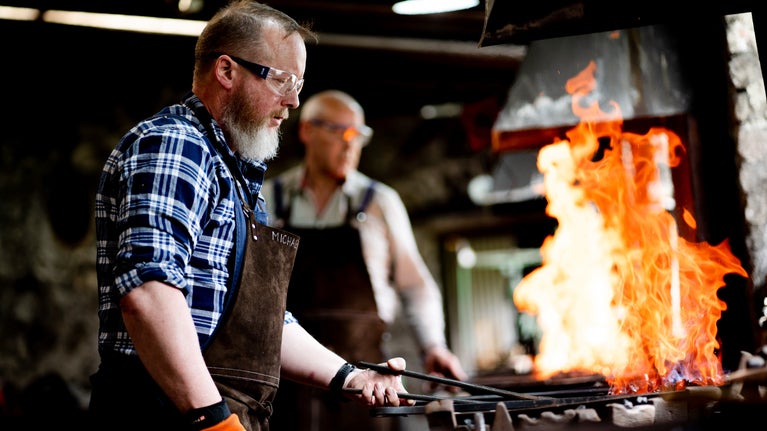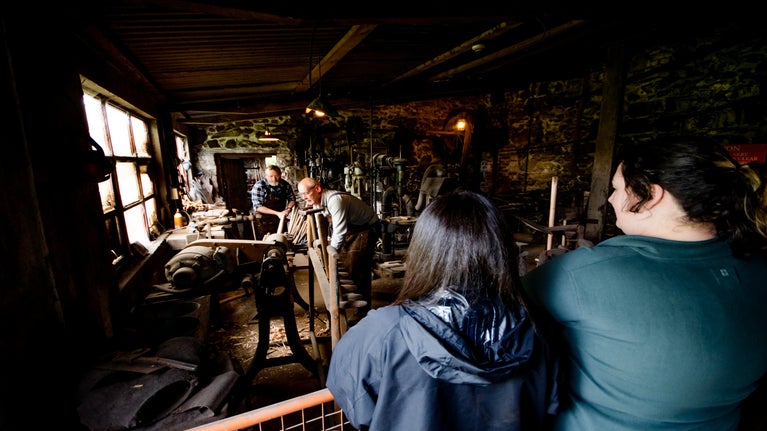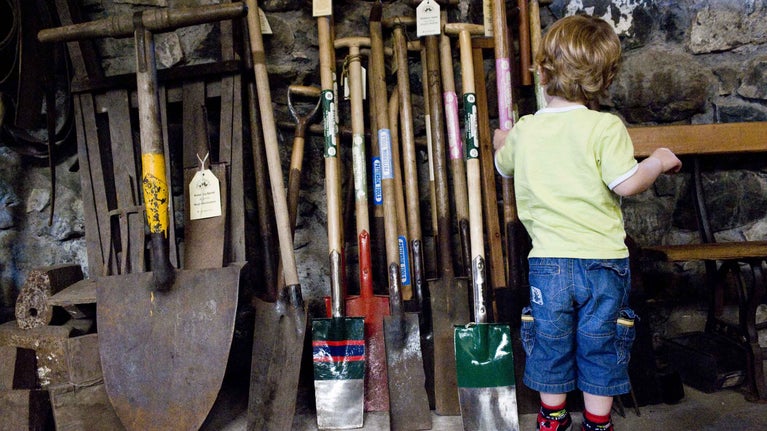
Discover more at Patterson’s Spade Mill
Find out when Patterson’s Spade Mill is open, how to get here, the things to see and do and more.

At Patterson’s Spade Mill, history and craftsmanship come together in a remarkable way. Since 1695, the Patterson family forged spades, passing down their skills through generations. The mill, now run by the National Trust, preserves the traditional art of spade making, offering visitors a unique window into this once vital industry. Today, Patterson’s is the last working water-driven spade mill in the British Isles, keeping alive the heritage of the Industrial Revolution.
Patterson’s Spade Mill was founded by William George Patterson in 1919, on a site that had housed a variety of industries, including a corn mill, paper mill, and linen beetling mill. This new venture was to become Northern Ireland’s last working water-powered spade mill. At its peak during the 1930s and 1940s, the mill employed over a dozen men, producing and delivering a wide range of spades, shovels, and loys across Ireland and beyond.
The craft of making spades at Patterson’s was, and still is, a deeply skilled business. Workers were not only masters of manufacturing techniques but also possessed an encyclopaedic knowledge of over 170 different spade designs used throughout Ireland.
Crafting a spade at Patterson’s has always required more than just technical skill. For generations, the knowledge passed down was purely oral—there were no written instructions or manuals. Fathers trained their sons, and new workers learned by doing, memorizing the intricacies of dozens of spade types for different purposes and regions.
Patterson’s remained in commercial production until 1990—long after other mills had closed—due to the unmatched quality and reputation of its spades. The mill’s survival into the late 20th century serves as a testament to its craftsmanship, with spades still being made here using traditional methods.
Patterson’s Spade Mill not only tells the story of skilled craftsmanship but also offers a glimpse into Northern Ireland’s industrial heritage. For centuries, spade making played a key role in rural life. The tools made here were not merely functional items; they were an essential part of Irish agriculture and everyday work.
In 1992, the National Trust took over the mill, which had become one of the last of its kind. The Trust’s restoration efforts focused on preserving the working machinery and tools, ensuring that visitors today can see spade making just as it was in its heyday.
Since opening to the public in 1994, the mill has become a vital site for understanding the Industrial Revolution’s impact on rural communities and the evolution of hand tools through the ages.

Patterson’s Spade Mill is not only known for its production quality but also for the incredible variety of spades it produced. With 171 different designs recognized across Ireland, each spade was uniquely crafted to suit the specific needs of various regions, from heavy digging in boggy soils to lighter work on dry land.
This variety was a reflection of Ireland’s diverse landscapes and agricultural practices, and workers at the mill needed an expert understanding of each type. Spade making at Patterson’s was, and remains, a precise art that blends craftsmanship with local knowledge.
Today, the National Trust continues to restore and conserve Patterson’s Spade Mill. Visitors can witness the full working process, from heating the steel to hammering it into shape. By maintaining the original machinery and techniques, we are preserving not only the physical structure but the entire tradition of spade making.
The mill also plays a key role in educating people about Northern Ireland’s industrial heritage, offering tours that delve into the history of the site, the workers who toiled here, and the vital role spade making played in Irish life.

Since acquiring Patterson’s Spade Mill, the National Trust has dedicated itself to preserving the traditional craft of spade making, while also modernizing the site to make it accessible to visitors. The mill’s equipment remains fully operational, allowing the blacksmiths and craftsmen here to demonstrate the entire process, from shaping the steel to turning the wooden handles.
Our work also includes offering workshops and educational programs to teach these traditional skills to future generations. Whether you're attending a hands-on blacksmithing class or taking a tour of the historic mill, your visit supports the Trust’s mission to keep this heritage craft alive.
'The skills of the blacksmith and spade maker are part of Northern Ireland’s cultural heritage. Our work at Patterson’s ensures that this knowledge is not lost, but shared with all who visit the site.'
James McCullough, Blacksmith at Patterson's Spade Mill

Carrying on a legacy of hundreds of years of spade making, James McCullough is now the blacksmith at Patterson’s Spade Mill.
Starting as a volunteer, James’ interest in the old art of forging and blacksmithing was fuelled by leading tours. He then worked as an assistant spade maker and, with the support of the National Trust, he became an apprentice blacksmith.
Once qualified, James began offering blacksmithing workshops at Patterson’s Spade Mill to share his knowledge, get others fired up about this traditional craft, and keep these heritage skills alive.
– James McCullough, Blacksmith at Patterson’s Spade Mill
Your support ensures that Patterson’s Spade Mill continues to operate as a living museum of craftsmanship and history. By visiting, taking part in a blacksmithing workshop, or purchasing one of our handcrafted spades, you are helping to protect this vital part of our industrial heritage.
For more information on our conservation efforts, workshops, or to order your own handcrafted spade, contact us at:
Patterson’s Spade Mill
Antrim Road, Templepatrick, Co Antrim, BT39 0AP
Tel: 028 9443 3619
Email: pattersons@nationaltrust.org.uk
With your ongoing support, we're able to continue our vital conservation work. Thank you for helping to protect these special places.

Find out when Patterson’s Spade Mill is open, how to get here, the things to see and do and more.

Discover the last working water-driven spade mill in daily use in the British Isles, learn about the old art of forging and have a go at making something yourself.

Discover a variety of volunteer opportunities in Belfast, with something to suit everyone.

We believe that nature, beauty and history are for everyone. That’s why we’re supporting wildlife, protecting historic sites and more. Find out about our work.

Read about our strategy, which focuses on restoring nature, ending unequal access and inspiring more people.